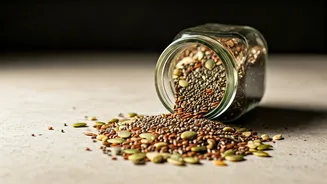Seed Superfood Status
The first widespread myth suggests that seeds are just a modern superfood trend. In truth, seeds have been a dietary staple for centuries, dating back
to ancient civilizations. Evidence suggests that historical records demonstrate the crucial role they played in providing vital nutrients. The current surge in seed popularity isn't solely a marketing ploy, but rather a rediscovery of their profound nutritional value. This highlights seeds' enduring place in human diets worldwide. The modern focus on seeds aligns with growing awareness of sustainable and nutrient-rich eating habits.
Seeds & Weight Loss
Another misconception is that all seeds contribute to weight gain. However, many seeds can support weight management. They are packed with fiber, which promotes satiety, helping individuals feel fuller for longer. This can reduce overall calorie intake. Furthermore, the healthy fats and protein in seeds aid in regulating blood sugar levels, preventing spikes that can lead to increased hunger and cravings. It's crucial to consume seeds in moderation as part of a balanced diet, as they are calorie-dense. Including seeds in a weight management strategy involves mindful portioning and pairing them with other nutritious foods.
All Seeds Alike?
A common mistake is the belief that all seeds offer the same nutritional profile and benefits. In reality, each seed type has a unique composition of nutrients and advantages. For instance, flaxseeds are rich in omega-3 fatty acids, crucial for heart health. Chia seeds excel in fiber, aiding digestion and blood sugar control. Pumpkin seeds are a good source of zinc, vital for immune function. Sunflower seeds supply vitamin E, an antioxidant. Understanding these differences allows for a strategic approach to incorporating seeds into your diet, focusing on those that meet specific health needs.
Seed Processing's Impact
There’s a misconception that processing seeds always diminishes their nutritional value. The truth is, how seeds are prepared significantly affects their impact. For instance, grinding flaxseeds is essential to unlock their nutrients, as whole flaxseeds often pass through the digestive system undigested. Roasting can enhance the flavor of some seeds, but may reduce the levels of certain vitamins. However, consuming seeds raw is also perfectly safe and can be a great way to retain all of the nutrients. The best way to benefit from seeds is to understand the effects of different processing methods.
Seeds & Allergies
Many incorrectly assume that all seeds pose a significant allergy risk. While some seeds, like sesame and sunflower seeds, are common allergens, the prevalence varies. Seed allergies are not as widespread as nut allergies. Furthermore, reactions range from mild to severe, differing among individuals. If there is a concern of allergic reactions, it's wise to start with small quantities. It's essential to understand the allergy risks of specific seeds. Seek guidance from a healthcare professional if any adverse reactions are noticed after seed consumption.
Seeds & Digestibility
Some people believe that seeds are inherently difficult to digest. While some individuals may experience digestive issues with certain seeds, this isn’t universally true. Seeds contain phytic acid, which can hinder mineral absorption to some extent. Soaking seeds overnight before consumption can reduce phytic acid. Chewing seeds thoroughly and consuming them with adequate fluids can aid digestion. For those with sensitive stomachs, starting with small amounts and observing how their bodies react is recommended. The method of preparation greatly influences digestibility.
Seeds’ Flavor Profiles
A misconception is that seeds lack flavor and add little to meals. Conversely, seeds offer a diverse range of tastes and textures that can enhance any dish. From the mild, nutty taste of sunflower seeds to the rich, earthy flavor of pumpkin seeds, they offer a wide variety of ways to level up a dish. Seeds can be roasted, toasted, or added raw to various dishes to add crunch and flavor. They can also be incorporated into smoothies, salads, baked goods, and even savory meals. Experimenting with different types of seeds can boost the culinary experience and provide beneficial nutrients.
Seeds’ Storage Safety
Many assume seeds can be stored in any conditions without concern. However, proper storage is crucial to preserve their quality and nutritional value. Seeds contain oils that can become rancid if exposed to air, heat, and light. It's best to store seeds in airtight containers in a cool, dark place, such as the refrigerator or freezer. Properly stored seeds can maintain their freshness and potency for months. Buying seeds in small quantities ensures they are consumed before they spoil. Adhering to these storage guidelines ensures that seeds retain their health benefits and delicious taste.















